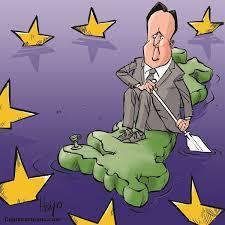
Recently the British Prime Minister publicly stated that if reforms are not made to the European project to better serve the British interests, he won’t be heartbroken with the UK leaving the European Union.
Cameron could indeed rally against the EU if a referendum on the EU membership would be organized in 2017 as he promised in case he wins the next general elections.
Fair enough, after all, the EU is not Scotland and we are not talking of a three hundred year old union that binds the Scottish nation with the rest of Britain.
At the same time, I guess many proponents of a stronger and more united Europe would not be heartbroken either if the UK left the EU.
Many believe that the European project could not move at a faster speed because of a UK intransigent position towards devolution of more sovereignty to Brussels.
Those supporting the UK membership lament that a EU without UK would lose much of its credibility and strength at the global level, especially taking into consideration the international clout that the British still maintain all over the world. At the EU level only the French can match the military might of the UK without thinking about the strong bilateral relations that Britain maintains with its former colony through the Commonwealth.
Germany the real powerhouse within the EU is a minnow in terms of foreign policy and power projection. Recent news revealed that the German air force is not even in a position to play a significant role within the NATO military alliance.
Foreign policy considerations aside, with an exit of the UK from the EU, the other European nations would lose a strong advocate of free trade and economic liberalization. Hardly only the Scandinavian members of the EU shares the same propensity toward liberalism though we should remember that the Swedish center right coalition, another strong ally of current conservative government of David Cameron, recently lost the general elections.
Economically speaking, London is one of the major world financial capitals and it would be a huge drawback for the EU to lose this, also keeping in consideration the hundreds of thousands of EU citizens living and thriving along the Thames.
David Cameroon is committed to do its best to reform the EU in order to better serve the national interests of the UK. This means a leaner bloc, more business oriented and certainly with a good amount of power devolved back to the member states.
Junker the incoming president of the EU Commission, who was strongly opposed by David Cameron, promised to work hard to address the UK’s concerns, offering a new narrative for the UK to continue to stay within the EU.
Would it be possible to reconcile divergent needs and positions? On one hand we have Cameron who is facing strong pressure, even within his own party who were never keen to more Europe, for UK to leave while, on other hand, those EU countries which have adopted the common currency are bound to more and more integration.
While it is possible to have a more effective, cost efficient and thinner EU which can champion global trade and advocate for the implementation of a full internal single European market, the European integration project is inevitable and cannot be stopped, at least for the members of the monetary union.
The problem is that a strong political will is still missing especially when European citizens, faced by a very precarious growth outlook and overall economic recessions that gave relevance to populist and protest parties, are blaming European institutions for the current situation.
Though it will take time, it will be frustrating and painful, there is no rear gear. The integration process will go ahead, possibly with better institutions and a simplified legal framework.
Few people realize that little and tiny steps towards more integration happen on a single day basis and this is irreversible.
Certainly the way EU institutions work is too complex and bureaucratic and definitely lacks transparency. Institutionally speaking very few people grasp the differences between the Council of the European Union with the European Council. The overall EU working procedures certainly need to be simplified and made more comprehensible to the citizens.
Complexity and lack of transparency are the real problem of the EU, not the lack of democracy. After all the decision making process at the EU level is led by the members states with their heads of state and national ministries all legitimately elected, the Parliament that is directly elected by the European citizens and the Commission appointed by the Head of states in cooperation with the Parliament.
What we lack is not legitimacy but a better governance system that can run the EU in a better and streamlined way, offering more value to European citizens.
Going back to the UK-EU relationship, a change will be welcome but not a radical one like a “brexit”. It is possible that the UK will renegotiate its power sharing agreements with the EU and will decide to keep one foot inside and the other one outside the EU. In principle all the member states reject this approach but pragmatism will prevail. After all Switzerland and Norway, though out of the EU do take part in many EU supported initiatives.
With one foot inside, Britain will hold much more influence than what Switzerland and Norway have by not being EU members. With a foot outside, the UK will bogging down the integration when other countries will be willing to move at a much faster pace.
At the decision level making, EU institutions, including the Parliament will have different formats depending on the topic discussed. Imagine a day where the EU Parliament will have a plenary session to talk about free trade with the full participation of British MPs and the following day a session with only the elected representatives of the EURO Area. Call it a “Turbo Two speeds Europe”.










Add new comment